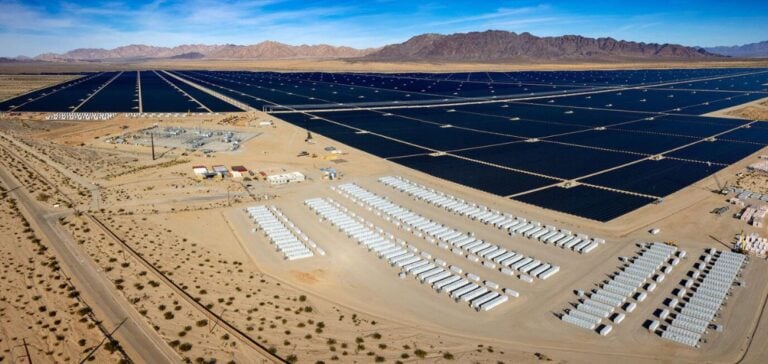The U.S. administration validates the Greenlink West project, a 472-mile transmission line in Nevada, linking North Las Vegas to Reno.
The project aims to transmit up to 4 gigawatts of electricity, enough to power around 5 million homes.
Greenlink West, developed by NV Energy, is part of a wider strategy to modernize electrical infrastructure, essential to integrating more renewables into the national energy mix.
Federal approval enables construction preparations to begin, while the project is estimated to cost $4.24 billion.
Expanding the transmission grid is crucial to meeting growing energy demand, especially in states like Nevada, where renewable energy production is expanding rapidly.
The development of Greenlink West is part of a drive to facilitate the flow of electricity generated by renewable sources to major consumption centers.
The government is counting on these infrastructure projects to support its energy policy objectives.
Libra Solar: Diversifying energy sources
In addition to Greenlink West, the Bureau of Land Management (BLM) is also approving the Libra Solar project, a 700-megawatt solar and storage facility in Mineral County, Nevada.
This project will become the largest solar and storage facility in the state, with enough capacity to power 212,000 homes.
The combination of Libra Solar with the Greenlink West transmission line offers a synergy that optimizes the transmission of locally-generated energy, reducing line losses and enhancing energy security.
Projects like Libra Solar address the need to diversify energy sources in Nevada.
By combining solar and storage technologies, the project aims to ensure a stable energy supply even when the sun is not shining.
These initiatives illustrate an integrated approach to meeting national energy challenges while offering viable local solutions.
Implementation Challenges and Regulatory Perspectives
However, the realization of these projects is not without obstacles.
The federal permitting process and environmental considerations can delay construction and increase costs.
In addition, the integration of new transmission lines often requires complex negotiations with local communities and stakeholders, particularly to minimize the impact on public and private lands.
US authorities are seeking to streamline approval procedures for such projects to avoid excessive delays.
Discussions on regulatory reforms and public-private partnerships are underway to facilitate the deployment of critical infrastructure.
These debates demonstrate the need for a more agile legislative framework that can accelerate investment in the energy sector without compromising safety and reliability standards.
Economic implications and future strategies
From an economic point of view, Greenlink West and Libra Solar are expected to generate jobs and revenue for Nevada, both during construction and operation.
The injection of capital into these projects also supports local supply chains, while stimulating demand for advanced technologies in the energy sector.
In the long term, improved transmission capacity and the development of projects such as Greenlink West and Libra Solar position Nevada as a strategic hub forrenewable energy transmissionin the United States.
The flexibility provided by new transmission lines could also reduce energy price volatility and improve resilience to fluctuations in demand.






















